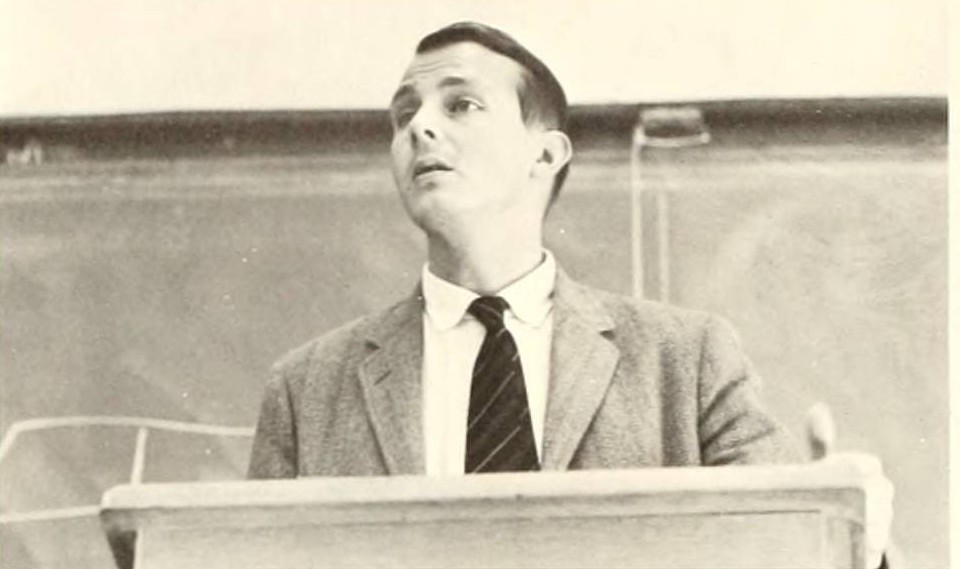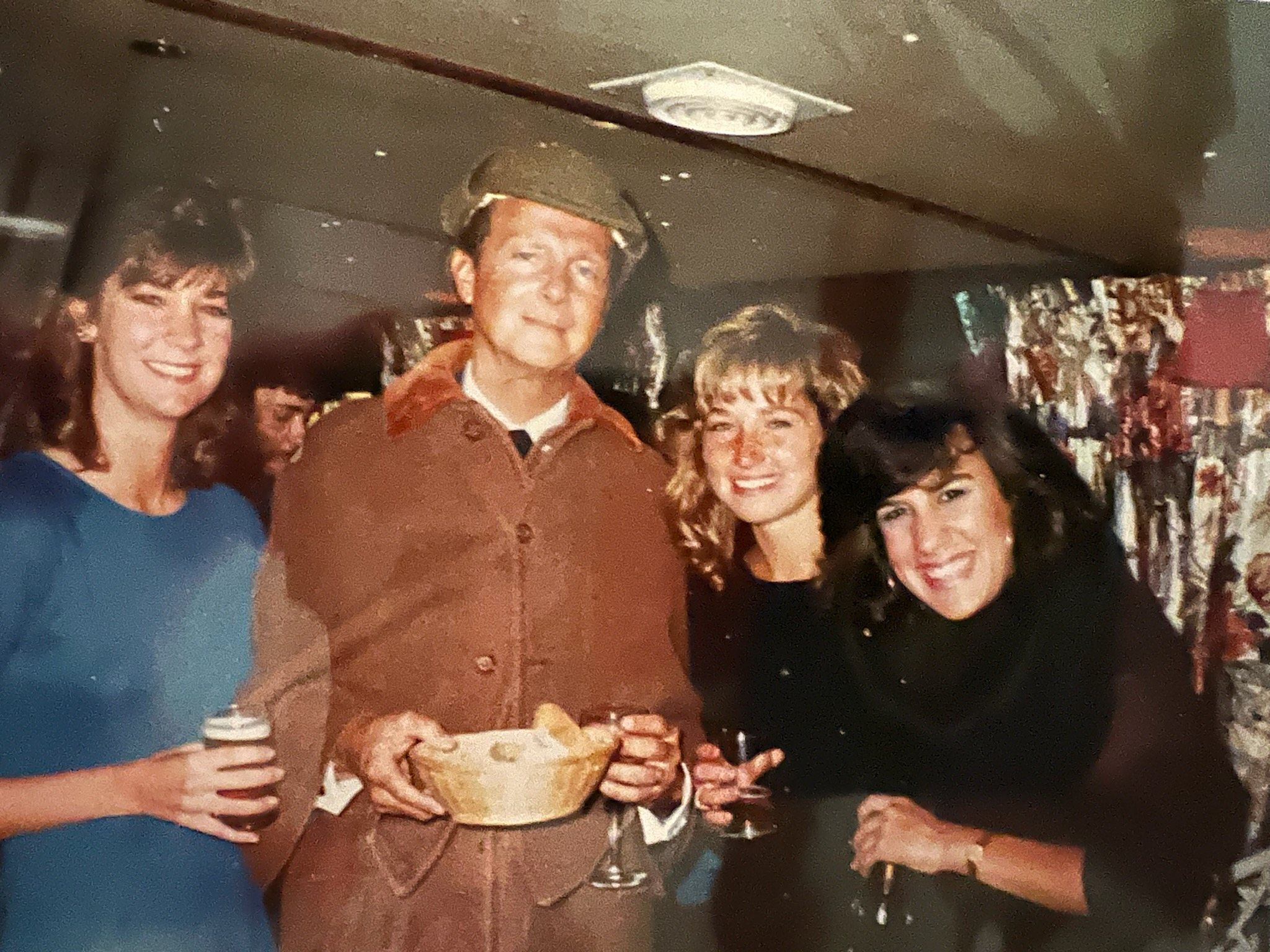
Inspired by memories in and beyond the classroom, a group of alumni work to honor the late professor Kimball King.
Join alumni who are supporting teaching excellence by making a gift to the Dr. J. Kimball King Distinguished Professorship Fund.
By Drew Guiteras, University Development
From the late 1960s to the early 2000s, in the weeks leading up to class registration at Carolina, a piece of advice was whispered through generations of Tar Heels, like the quiet sharing of a family’s secret recipe. To the student planning the upcoming semester, this advice may have come from a friend or older sibling — or in the later years, even from a parent (and perhaps dutifully followed, but no doubt with an eyeroll).
It went something like this: Find out what class English professor Kimball King will teach next semester and enroll in it.
Thousands of versions of the same conversation typically followed, leaving both parties exasperated.
Young Tar Heel: “But I’m not an English major.”
Old Tar Heel: “Doesn’t matter. Take the class.”
Young Tar Heel: “But I don’t need it to graduate.”
Old Tar Heel: “Doesn’t matter. Take the class.”
Young Tar Heel: “But I hate reading.”
Old Tar Heel: “And I hate repeating myself. Take. The. Class.”
For John Preyer ’90, it was a friend who shared the “take the class” advice. Preyer initially resisted, protesting that he was a political science major with no use for 20th-century British theater.
“I said, ‘I don’t want to read a bunch of British plays,’” Preyer recalled. “My friend said, ‘Just trust me, you’re going to love him.’ The class was full by the time I registered, but Kimball ended up making a spot for me — and that changed my life.”
Cultivating love of literature

King leads a class discussion in 1967.
Arriving at Greenlaw Hall each morning dressed neatly in a jacket and tie, King carried himself with a look and manner that suggested the Ivy League style of his hometown of Princeton, New Jersey. A student wandering into his class for the first time might mistakenly expect a more traditional approach to teaching, a professor intent on imparting his own considerable knowledge while spending no time cultivating enjoyment of or connection with the material.
But King’s teaching style was precisely the opposite of that. For King, personal responses to art and literature were all that mattered. Leaning casually against a lectern, King started class with questions meant to draw out students’ individual reactions: What did you think about the reading? How did this passage make you feel? Does this character’s situation reflect your own?
“He loved what he taught, and he wanted you to love what he taught too,” said John Townsend ’77, ’82 (MBA). “He wasn’t there to figure out who should get an A and who should get a C. He wanted you to love great works of art, and he was very successful at that.”
Class discussions were lively and extemporaneous, hitting on current events or personal experiences and infused with healthy doses of King’s characteristic humor. After pointing out T.S. Eliot’s odd obsession with receding hairlines in “The Love Song of J. Alfred Prufrock,” King once noted his own acute awareness of the fact that students peered down on him in a large lecture hall.
“You might assume I think about books all day, but really, I think about whether my hair looks thin from the top rows,” King said, stooping forward and patting the top of his head to laughter from the class.
Students adored King for these moments of approachability, for his sincere interest in their literary tastes and for his insistence that great works of literature were created to fill human beings just like them with feelings that were worthy of deep exploration.
A group of former students are now fundraising to create an endowed professorship in honor of King, who died in 2019. With additional gifts, the Dr. J. Kimball King Distinguished Professorship will support a faculty member whose teaching and scholarship cultivate appreciation of and deeper connection with literature.
“Dr. King was a true UNC treasure,” said Perrin Jones ’94. “The impact he had on students over such a long period of time is remarkable. This is meaningful for me because I want to preserve his memory and his legacy, and I want to honor everything he did to help me.”
King excelled at fostering relationships with students that extended beyond their time in his classes and even at Carolina. Many shared the startling experience of running into King a year or more after taking his class, certain that the professor wouldn’t be able to recall them from the thousands of faces that had sat in front of him through the years. King would cheerfully greet them by name and then offer a book or theater recommendation based on a work they had liked.
Edwin Poston ’89 took several classes with King in the late 1980s. About two decades after he graduated, Poston and his wife were visiting Chapel Hill as they considered moving back from New York. Pushing their young daughter in a stroller while walking downtown at dusk, Poston heard a familiar voice calling from down the street.
“Ed! Hello, Ed!”
King enthusiastically flagged down his former student and launched into conversation as if he had seen Poston just earlier that week. The Postons ultimately moved to Chapel Hill, becoming close friends with King and his wife, Harriet. Preyer and his family also live in Chapel Hill near the King family and would occasionally open their mailbox to discover homemade baked treats, courtesy of Harriet.
These touches of personal warmth were a hallmark of the Kings, who would often trade postcards with graduates who were attending plays in New York or London. They were popular guests at alumni weddings and, in keeping with their commitment to encourage a love of reading, would send children’s books to former students celebrating the birth of a child.
Academic innovator

King with students during a London trip.
Hired at UNC for his expertise in American and Southern literature, King found that his interests evolved to include modern theater and film at a time when those subjects — especially film — were not widely taught at universities. King nonetheless forged ahead and created a curriculum for a film class, at times having to battle deans and administrators for approval.
His film criticism class, a first at Carolina, was launched in 1967 with Professor Martha Nell Hardy and remained a popular course for years. Many students undoubtedly enrolled thinking they could snooze through a few movies, only to have their eyes opened to the likes of Ingmar Bergman and Andy Warhol. (Another beloved Carolina icon, Michael Jordan ’86, was a student. Perhaps teammate and fellow hall-of-famer James Worthy ’85 gave Jordan the “take the class” advice.)
King also led summer trips to London for 25 years, helping more than 1,000 students discover the power of productions at the city’s many world-class theaters. The list of plays would range from classics like Shakespeare to avant-garde productions by contemporary playwrights.
King was well-known and respected among many luminaries of modern theater, including the award-winning British playwright Sir David Hare. In his autobiography, Hare noted that King “knew as much about modern theatre as anyone alive.” After spending a week co-teaching with King, Hare observed that King’s students “were impossible to fool.”
King was never reticent to share these personal connections with undergraduate students, whether or not they were well-versed in a playwright’s works. Proudly and assertively, he facilitated introductions between leading writers and students, even those who were still in the greenest stages of their literary development.
On one London trip, Brandon Lowery ’99 recalled seeing a production of Tom Stoppard’s “Rosencrantz and Guildenstern are Dead” soon after the film “Shakespeare in Love” had catapulted Stoppard to a new level of fame. Stoppard was in attendance that night and came over to greet King, who insisted on an impromptu discussion with his students. Other students remembered meetings and discussions with writers and actors including Sam Shepard, David Mamet and John Malkovich.
Beyond the classroom
King loved learning about students’ personal passions and would leap at opportunities to support their creative endeavors by purchasing artwork or attending performances. In the 1970s, he hired a student’s Rolling Stones cover band, the One Eyed Jacks, to play on the lawn of his house to the dismay of his neighbors along the peaceful, tree-lined residential street in Chapel Hill. He was also supportive of theater at Carolina and a fixture in the crowd at UNC’s Playmakers Repertory Company, serving on its board and frequently hosting cocktail parties before performances.
Students were regularly invited to dinners and receptions at the King home, but his support went well beyond social engagements. Ramsey White ’01 remembers the spring of her senior year when her roommates received letters from the University confirming the spelling of their names for diplomas. Curious that she hadn’t gotten a letter, White contacted her advisor and found out that a seemingly minor classification change to a course left her one hour shy of qualifying to graduate.
“There was a tearful call home, but after that my first instinct was to go to Dr. King because he was the person I trusted,” said White, who had traveled to London with King. “He told me that he’d find a way through the red tape and set up a list of plays for me to watch and write papers about. If you look at my transcript there is a one-hour independent study with Dr. King, and that’s the reason I graduated on time.”
Visits to King’s office invariably covered much weightier topics than the week’s assigned reading. Former students shared stories of the support King offered to them or their friends: help with addiction and ensuing legal troubles; counsel following the sudden and tragic loss of a sibling; a nudge of encouragement during a period of doubt about pursuing law school.
Former student Mustafa Shah-Khan ’94, ’02 (DDS), who jokes that he “minored in Dr. King,” sought advice while considering whether to attend dental school or medical school.
“He helped me focus on the human questions,” Shah-Khan said. “He asked about which path would lend itself to the life I wanted, and which would offer work that I would enjoy most. It was a profound moment because those were not the questions I had been thinking about.”
Shah-Khan chose dental school and is now a practicing dentist in Charlotte, North Carolina. He invited King to his wedding and keeps a photograph of the beloved professor surrounded by many former students who were also in attendance.
‘He would be very proud’
King was a prolific scholar who authored and edited 13 books and dozens of academic papers, but his passion for teaching and the relationships he built with students were always the centerpiece of his lengthy career. His son Scott said that the Tanner Award for Excellence in Undergraduate Teaching hangs prominently on the wall in the King home, right beside diplomas and cherished photos of family.
Scott King said the movement to create an endowed professorship represents the ideal way to honor his father.
“We would love to see his name live on in association with the University he devoted his life to, and he would be very proud of that as well. He was very committed to teaching, and his hope was always that he could help people appreciate the range of great writing and drama and art out there in the world.”
Related Stories






